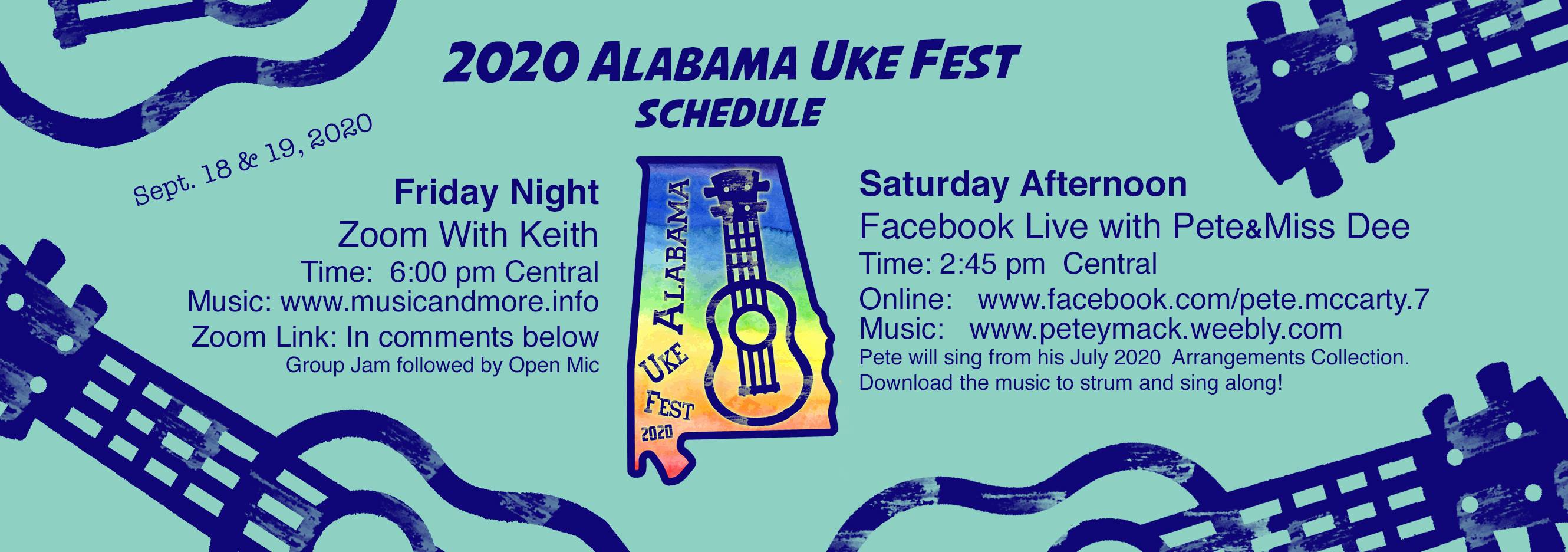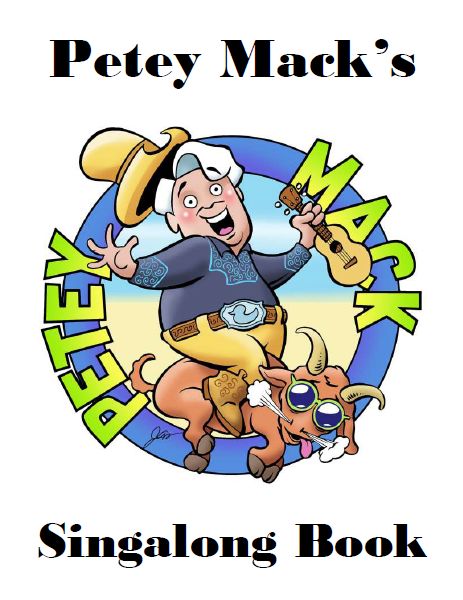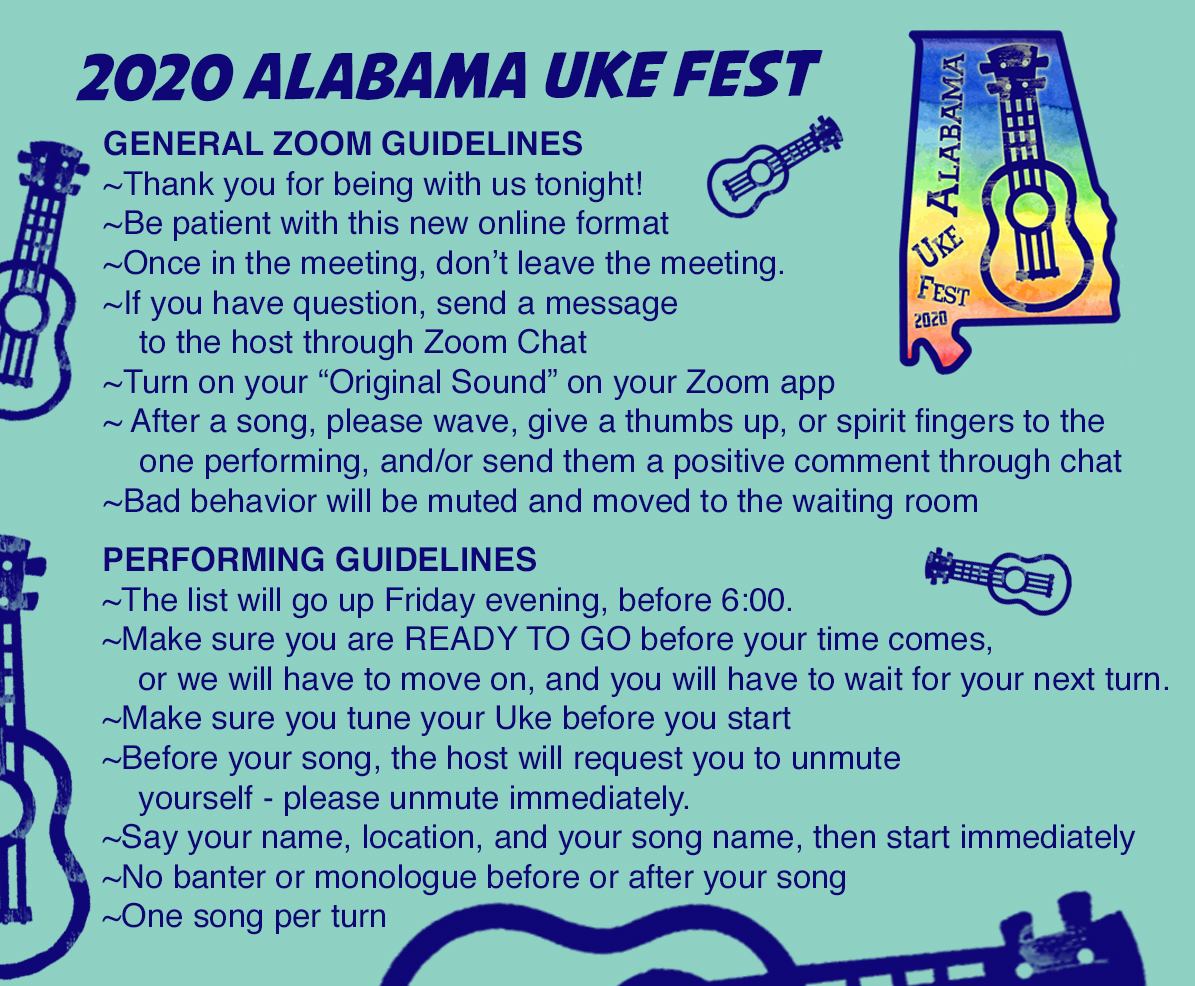Alabama
Uke Fest
2020
(Virtual)
|
Alabama Uke Fest 2020 (Virtual) |

 Although
COVID-19 forced cancellation of the annual gathering at Lake Guntersville, a
virtual Alabama
Ukefest will be held Saturday, Sept. 19, beginning at 2:45 pm Central Time.
Pete McCarty will host the event at his
Facebook page; songs will be from
Petey Mack's Singalong Book (July, 2020 edition).
Although
COVID-19 forced cancellation of the annual gathering at Lake Guntersville, a
virtual Alabama
Ukefest will be held Saturday, Sept. 19, beginning at 2:45 pm Central Time.
Pete McCarty will host the event at his
Facebook page; songs will be from
Petey Mack's Singalong Book (July, 2020 edition).
Friday Night Share And Strum
As in past years, there was be a Group Strum and Open Mic, on Friday, September 18, from 6 - 9 pm, Central Time, although this year it will be held via Zoom (links were be posted at Alabama Uke Fest). Host Keith Fukumitsu reported that 45 people participated and others wrote that they had a great time!
This page was a "mirror" to the songs posted on the official Alabama Uke Fest web page maintained by the Ukulele Band of Alabama.
A compiled songbook was available for all songs submitted by Thursday, Sept. 17, at noon, and a final songbook is now posted.
Music from the 2019 Ukefest is available at Alabama Uke Fest - Music and also in these PDF compilations, Friday Night Share and Strum UF19 - Final Songbook and The 2019 Alabama Ukefest Singalong Book (and Pete's songbook in two-line format: Pete McCarty - Alabama Ukefest 2019). Links to other music is at Ukulele Websites and Resources and on the main page of MusicAndMore.info.
Final Posting of Songs and the Final Songbook
Friday Night Share And Strum Songbook.pdf (as of Sept. 21, 2020)
Friday Night Share And Strum Songbook-Pages.pdf (as of Sept. 21, 2020, with page numbers)
Individual song sheets are available below.
Please let me know if you find any errors or have suggestions for improvement.

Group Photographs of 2020
Submissions
Songs received in MS Word format are saved in Adobe PDF
format for those who (like me) do not own MS Word.
Both the original MS Word and the created PDF files are posted.
Alphabetical Listing of Submitted Songs
A B C D E F G H I J K L M N O P Q R S T U V W X Y Z
|
Song Sheet |
YouTube Link |
|
Always Look on the Bright Side.docx &
In two-line format:
Written in the British music hall
tradition, the song touches on stoicism and the "stiff upper lip" spirit
in the face of adversity, so often associated with British people. It
became immensely popular, reaching No. 3 on the UK Singles Charts in
1991. |
Always Look on the Bright Side from the 1979 film "Monty Python's Life of Brian" Always Look on the Bright Side by Eric Idle on The Late Late Show with James Corden (2018) |
|
Anna
(C).pdf (Arthur
Alexander, 1962) |
Anna (Go To Him) by Arthur Alexander (1962) Anna (Go To Him) by The Beatles from "Please Please Me" (1963); in the US it was on "Introducing... The Beatles" (January 10, 1964) |
|
Song Sheet |
YouTube Link |
|
In two-line format: |
Baby Baluga by Raffi (Live performance with the Rise & Shine Band, 1988) |
|
Beat It The Horse With No Name (A Mashup) |
|
|
Blame It On Coronavirus (C).pdf &
Blame It on Coronavirus (C).docx
(Original lyrics by Cynthia Weil, music by Barry Mann, 1963;
updated lyrics by Keith Fukumitsu) |
Blame It On The Bossa Nova by Eydie Gormie (1963) |
|
Song Sheet |
YouTube Link |
|
Can't Help But Smile.doc & Can't Help But Smile.pdf (Jim Beloff, 2004) found in "The Daily Ukulele" by Jim and Liz Beloff, p. 50. Can't Help But Smile.pdf (Key of G with chord diagrams), Song 703 from the TVUC Songbook, Version 2.2.5. |
Can't Help But Smile Ukulele Playalong by Jim and Liz Beloff Can't Help But Smile Ukulele Playalong by Jim and Liz Beloff at the Uke New Jersey Too! festival, Aug. 29, 2014 |
|
Crayola Doesn't Make A Color (C).doc & Crayola Doesn't Make a Color (C).pdf (Kristin Andreassen & Megan Downes, 2006-2007) (In C)
Crayola Doesn't Make a Color for Your Eyes.pdf (B♭ & F) |
Crayola Doesn't Make a Color for Your Eyes by Kristin Andreassen from the album "Kiss Me Hello" (2007) Crayola Doesn't Make A Color For Your Eyes by Kristin Andreassen (Video) Crayola Doesn't Make A Color For Your Eyes by Tyne Daly at the 2009 MAC Awards Crayola Doesn't Make A Color For Your Eyes by Kristin Andreassen live for the Music Fog cameras in New York at Midtown Live |
|
Crocodile Rock (in
D).pdf (Elton John & Bernie Taupin, 1972) |
Crocodile Rock by Elton John (1972) |
|
Song Sheet |
YouTube Link |
|
This was an Open Mic performance by the song's writer, Rose Marie Sand. |
|
|
Dream
Baby.pdf
(Cindy Walker (1918-2006), ca. 1962) |
Dream Baby by Roy Orbison (1962) Dream Baby by Glen Campbell (1971) Dream Baby by Lacy J. Dalton (1983) (good bass line) Dream Baby by Hootie and the Blowfish (1995) |
|
Song Sheet |
YouTube Link |
|
Feelin' Groovy (59th Street Bridge Song).pdf (Paul Simon, 1966) |
59th Street Bridge Song (Feelin' Groovy) by Simon & Garfunkel from their 1966 album "Parsley, Sage, Rosemary and Thyme" 59th Street Bridge Song (Feelin' Groovy) by Simon & Garfunkel from the Concert in Central Park (Video) 59th Street Bridge Song (Feelin' Groovy) by Simon & Garfunkel, Live at Carnegie Hall, New York, July 1970 59th Street Bridge Song (Feelin' Groovy) by Harpers Bizarre (1967)
|
|
Fifty Ways to Beat Corona.doc & Fifty Ways to Beat Corona.pdf (Adaptation by Theresa Miller, 2020; music by Paul Simon, 1975) |
50 Ways To Leave Your Lover by Paul Simon from "Still Crazy After All These Years" (1975) |
|
Song Sheet |
YouTube Link |
|
I Believe in Music.pdf (Mac Davis, 1970)
In two-line format:
In a 2017 interview, Davis said the song
was inspired while he was in England at the home of Lulu and Maurice
Gibb: I Believe In Music, Wikipedia. |
I Believe In Music by Mac Davis (1970) I Believe In Music by Helen Reddy (Live at the Troubadour, 1972) I Believe In Music by Gallery (1972) |
|
I Can See
Clearly Now (in-D).pdf (Johnny Nash, 1972) |
I Can See Clearly Now by Johnny Nash (1972) |
|
Song Sheet |
YouTube Link |
|
Margaritaville (C).pdf
(Jimmy Buffett, 1977) |
Margaritaville by Jimmy Buffett from his album "Changes in Latitudes, Changes in Attitudes" (1977) |
|
Song Sheet |
YouTube Link |
|
Octopus's Garden.pdf (Richard Starkey performing professionally
Ringo Starr, 1968-69) |
Octopus's Garden by The Beatles from their 1969 album "Abbey Road" Octopus's Garden by Ringo Starr (Live, 2005) Octopus's Garden by Jim Henson's Muppets (1969, 1970, 1978), from the Ed Sullivan TV Show, March 1, 1970 Octopus's Garden by Raffi (1985) |
|
O-O-Child.pdf
(Stan Vincent, 1970) |
O-O-Child by The Five Stairsteps (1970) |
|
Song Sheet |
YouTube Link |
|
Silver Threads & Golden Needles (C).pdf (Dick Reynolds & Jack Rhodes, ca. 1956) |
Silver Threads and Golden Needles by Wanda Jackson (1956); initial recording with over 60 known covers. Silver Threads and Golden Needles by The Springfields (1962), reached #20 on the US on the Billboard chart, the first single by a British group ever to do so, months before The Beatles and the British invasion. Silver Threads and Golden Needles by Linda Ronstadt (1973) |
|
Song Sheet |
YouTube Link |
|
They All Asked For You - 1.pdf (with graphics) They All Asked For You - 2.pdf (without graphics) |
They All Asked For You by the Meters from their 1975 album, "Fire On The Bayou." |
|
Song Sheet |
YouTube Link |
|
You're The One That I Want (Dm).pdf (John Farrar, 1978) |
You're The One That I Want by Olivia Newton-John & John Travolta from the 1978 movie "Grease" |
No
music posted on this website should be used for any kind of financial gain.
All
song copyrights belong to their respective owners. Please respect the rights of
others.
All song sheets and songbooks available from this website are intended for
private, educational, and research purposes only.
Feel free to check out a few interesting
Ukulele Websites and
Resources
including:
Beginner's Materials
Chord Charts
Songbooks & Workbooks
North Alabama & Tennessee Ukulele Clubs & Interest Groups, and
Links to Other Music and Information
Return to Ukulele Gatherings of North Alabama
Return to Music And More